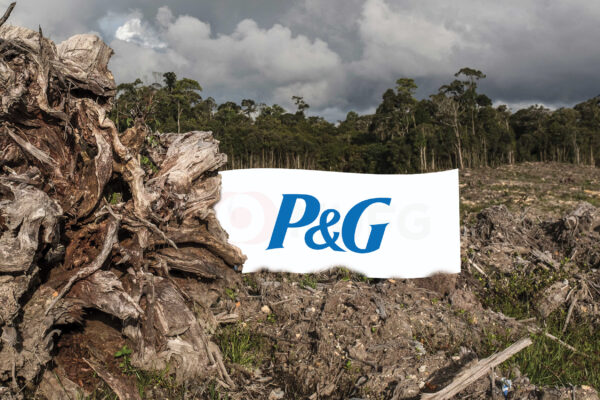As a global company with global reach, Procter & Gamble has a huge appetite for product ingredients. Some of these ingredients require large amounts of land to produce. This can harm forests, endangered species and Indigenous peoples and local communities (IPLCs).
Two such ingredients — palm oil and pulp & paper — appear in many of Procter & Gamble’s popular beauty, fabric and home care brands. These ingredients and other “forest-risk” commodities like beef, soy, cocoa and timber are primary drivers of deforestation globally.
Forest-risk commodities are also major drivers of land conflict. As agriculture and pastureland expand, land conflict can follow. This conflict too often results in repression and violence against IPLCs and human rights defenders.
What can be done?
Many brands and banks have adopted No Deforestation, No Peat, No Exploitation (NDPE) policies out of a desire to eliminate deforestation, peatland destruction and rights abuses from forest-risk supply chains and portfolios.
Nonetheless, our most recent investigation finds that 17 of the world’s biggest brands and banks have failed to follow the letter and spirit of NDPE. Procter & Gamble is one of them.
In contrast to major competitors like Unilever and Colgate-Palmolive, Procter & Gamble has made very little progress on cleaning up its supply chain.
Procter & Gamble’s ongoing supply chain issues
Despite recent pressure from shareholders, Procter & Gamble refuses to make wholesale commitments to key NDPE policies. At the same time, it makes unfounded claims about the integrity of its sourcing practices.
Revelations about Procter & Gamble’s supply chains over the past several years belie those claims:
- Destruction of endangered species’ habitat in Indonesia’s protected Leuser Ecosystem. On three separate occasions, RAN caught P&G suppliers with Royal Golden Eagle (RGE) sourcing palm oil illegally from parts of the Leuser Ecosystem in 2019, 2020, and 2021. The Leuser is the last remaining habitat of critically endangered Sumatran orangutans, tigers, rhinos, and elephants.
- Widespread deforestation in Borneo, “The Lungs of the Earth.” In 2021, we reported that P&G suppliers had converted 552,000 acres of rainforest to oil palm in Indonesian Borneo — one of the planet’s most critical and most endangered rainforest biomes.
- Forced labor. A yearlong U.S. Customs investigation found that Procter & Gamble palm oil suppliers FGV and Sime Darby were using forced labor, which resulted in an import ban.
- Destructive logging in Canadian boreal forests. A Stand.Earth report from 2021 revealed Procter & Gamble’s role in destroying temperate forests in Canada.
What can Procter & Gamble do?
Despite ongoing challenges, real progress is within reach: Procter & Gamble can not only lessen its negative impacts on forests and frontline communities, it become an industry-wide leader with the following steps:
- Suspend all sourcing from Royal Golden Eagle (RGE) group. RGE is connected to the theft of lands belonging to the Pargamanan-Bintang Maria community in Sumatra, Indonesia, and to many documented instances of rainforest destruction.
- Respect the rights of Indigenous peoples and local communities. Adopt Free, Prior, and Informed Consent (FPIC) policies and a policy on the protection of human rights defenders.
- Prohibit suppliers from clearing or logging primary forests or intact forest landscapes.
- Adopt No Deforestation, No Peat, No Exploitation (NDPE) across all forest-risk commodity sectors.
- Disclose Procter & Gamble’s global forest footprint, accounting for the company’s global impact on forests.
Procter & Gamble has a vast and growing appetite for product ingredients. But growth cannot be at the expense of our planet and frontline communities. As company CEO Jon Moeller himself says, Procter & Gamble must be “both a force for growth and a force for good” — they are, “inseparable.” It’s long past time for Procter & Gamble to start acting like it.
